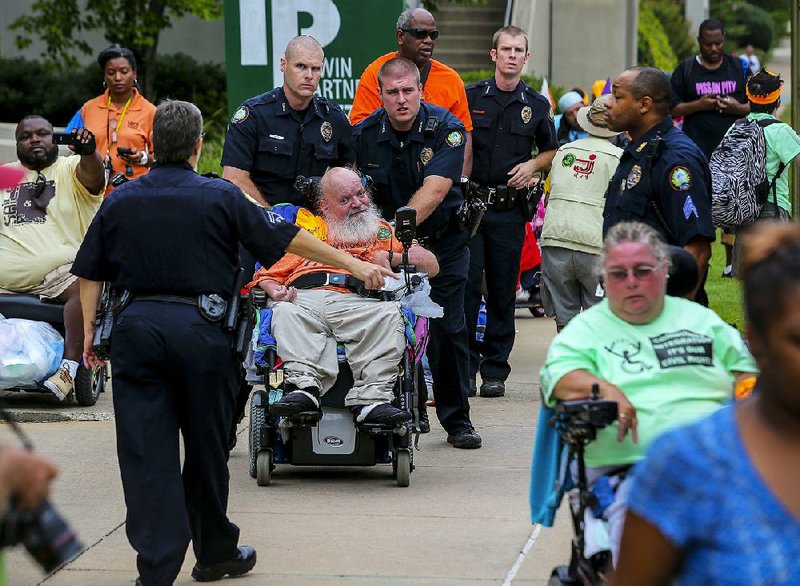Correction: The state Medicaid program offers a home- and community-based program that, because of limited state general revenue, was capped at 4,183 slots. As participants leave the program, those on a waiting list fill the vacant slots. An article Tuesday about the group American Disabled for Attendant Programs Today incorrectly stated the status of the home- and community-based program.
About 200 members of a national disabilities-rights organization flooded the state Capitol on Monday, armed with a list of demands and insisting on an audience with Gov. Mike Beebe.
While the line of wheelchairs waiting for the elevator to the second-floor rotunda snaked down the entrance driveway, dozens of representatives of the Texas-based organization ADAPT crowded into the governor's office and conference room.
Beebe greeted the unexpected visitors with handshakes before agreeing to hear the list of demands presented on behalf of the group by Brenda Stinebuck, the leader of Arkansas' ADAPT chapter.
The group -- which began its Arkansas campaign Sunday with a march to the Capitol steps, then a rally -- demanded that Beebe publicly commit to implementing the Community First Choice Option for the state. Established under the Patient Protection and Affordable Care Act of 2010, the option would increase federal funding to state Medicaid programs for home- and community-based attendant services.
To address a shortfall in the state's Medicaid program last year, the state froze at current levels any participation in community-based services, which are used to help keep elderly or disabled people in their homes instead of institutionalized care.
The ADAPT group -- whose out-of-state members are expected to stay in Arkansas through Wednesday -- also marched on numerous other organizations in the state Monday, demanding support and action. Little Rock police spokesman Sgt. Cassandra Davis said dozens of the protesters were arrested Monday afternoon at the offices of the Arkansas Health Care Association and the Arkansas Assisted Living Association and charged with trespassing.
Davis said 36 protesters were released immediately after being issued citations.
Currently, there are 2,993 Arkansans on a waiting list for a waiver that would fund in-home care instead of forcing them into institutional services, state Department of Human Services spokesman Amy Webb said.
"The person at #1 on the list has been waiting a little over eight years," she wrote in an email.
Beebe told the crowd at the Capitol that he has been supportive of the initiative from the beginning but that it was going to require legislative support.
"You don't want them in January to turn against it and stop it. Of course, I'm not going to be here. Come Dec. 31, my eight years as governor will be over, and you'll be dealing with a new governor. We'll do our best to try to give him all the facts, whoever it may be, and certainly try to let them know what this means to the people," Beebe said.
Stinebuck also presented demands including that the governor immediately develop a plan with Arkansas ADAPT and other disability-rights advocates to increase Medicaid funding for long-term services so that 60 percent of those funds support home and community-based services by 2020, and establish a governor-appointed work group of disability-rights advocates, among other things.
Beebe told the group that he would continue to "have those conversations" with the Legislature but that he could not make promises of action because he will not be in office. He encouraged the group to reach out to legislators and policymakers "nicely and politely."
"There's nothing like community support to change legislative minds," Beebe said.
Stinebuck said she felt the meeting was successful, even if the only concession was the governor voicing his public support of the Community First Choice Option.
"This is very, very big to us," she said.
Jessie Kemp of Hot Springs said Monday's audience with the governor allowed disabled Arkansans to have the voice that they were denied when the budget cuts were decided.
"I feel like we made a huge accomplishment today. I'm very happy that we're on the same page," she said.
Stephanie Woodward -- who uses a wheelchair because of spina bifida and came to the rally from Rochester, N.Y. -- said Beebe used his limited remaining time in office as a "scapegoat."
"Just because he's leaving doesn't mean he gets to stop caring about the people of the state," she said.
Sammy Nelson, an above-the-knee amputee who lives and works in Hot Springs, said he "rejoiced" when he heard the governor proclaim his support of the Community First Choice Option. Nelson, who is raising his 15-year-old daughter on his own, said that if his condition worsens, he would be forced into an institution.
That choice, he said, would mean his daughter would have to move to Missouri with relatives.
"We want to live in the community and prosper, to be of service to others," he said. "I'm glad to hear he's on our side."
Metro on 09/16/2014
